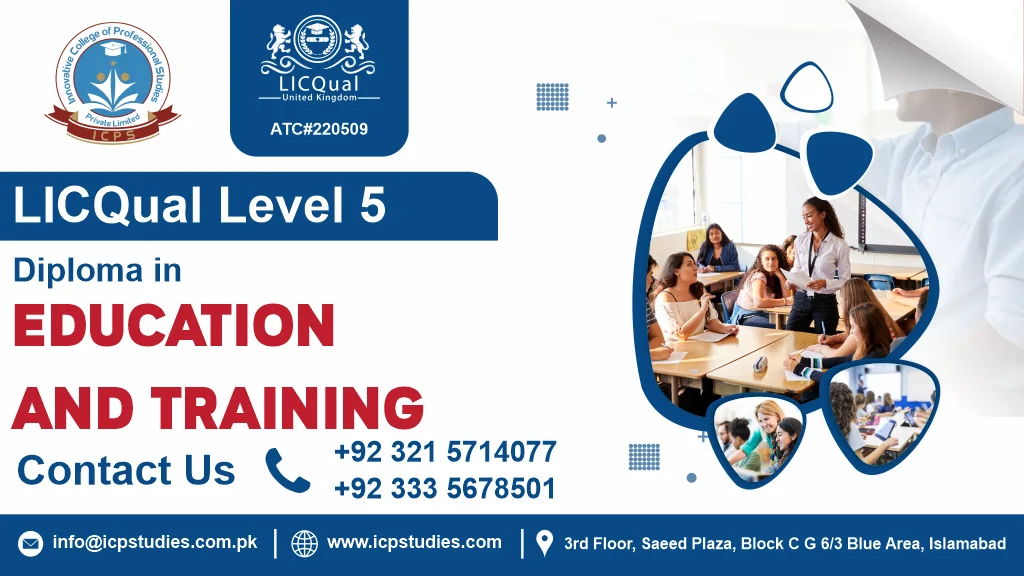As the landscape of education evolves, the demand for skilled and knowledgeable educators continues to grow. The Level 5 Diploma in Education and Training is an advanced qualification designed to enhance the skills and competencies of professionals working in the field of education and training. Whether you’re a seasoned educator looking to deepen your expertise or an aspiring trainer aiming to make a significant impact, this diploma offers a pathway to achieving your career goals.
The Level 5 Diploma in Education and Training is a comprehensive qualification aimed at equipping individuals with the advanced skills required to deliver effective education and training. It is intended for those who are already working or wish to work in teaching or training roles, including teachers, trainers, and assessors. This diploma provides a deeper understanding of pedagogical principles, instructional design, and assessment techniques, enabling professionals to enhance their teaching practice and contribute to the development of learners.
Level 5 Diploma in Education and Training offers a comprehensive pathway for advancing your career in education and training. With its focus on enhancing teaching skills, professional recognition, and career progression, this qualification provides the tools and knowledge needed to make a significant impact in the field. Whether you’re looking to enhance your current role or pursue new opportunities, the Level 5 Diploma equips you with the expertise to excel and contribute effectively to learner development and educational success.
All About Level 5 Diploma in Education and Training
Course Overview
The Level 5 Diploma in Education and Training is a specialized qualification designed for individuals who are already working in or aiming to enter the field of education and training. This advanced diploma is intended for those who wish to enhance their skills and knowledge in teaching, training, and assessment, providing a deeper understanding of educational practices and methodologies.
Level 5 Diploma in Education and Training is a valuable qualification for those looking to enhance their expertise in teaching and training. It offers a blend of theoretical knowledge and practical skills, providing a strong foundation for career advancement and professional growth in the education sector. Whether you are aiming to improve your current practice or explore new opportunities, this diploma equips you with the tools needed to excel in education and training.
Study Units
- Understanding Education Theories and Models
- Effective Lesson Planning and Delivery
- Inclusive Teaching and Learning
- Assessment and Feedback Strategies
- Educational Policies and Practices
- Reflective Teaching and Professional Development
- Digital Technologies in Education
- Collaborative Working in Education and Training
To enroll in the LICQual Level 5 Diploma in Education and Training, candidates should meet the following criteria:
- Relevant Professional Background: Applicants should have experience in a teaching, training, or educational role, such as educators, trainers, or instructional designers.
- Minimum Qualification: A Level 4 qualification in a related field (such as a Certificate in Education or Training) is typically required to ensure foundational knowledge.
- Practical Teaching Experience: Candidates should have hands-on experience in delivering educational or training sessions, ideally in diverse learning environments.
- Strong Communication Skills: Effective verbal and written communication skills are essential for creating lesson plans, delivering presentations, and engaging with learners.
- Commitment to Professional Development: A demonstrated interest in enhancing skills and knowledge in education and training practices.
- Pre-Course Assessment: Some providers may require candidates to complete an assessment or interview to evaluate their suitability for the course.
- Understanding of Teaching and Learning Theories: Familiarity with educational theories and principles of teaching and learning is beneficial but can be developed during the course.
The LICQual Level 5 Diploma in Education and Training is tailored for a diverse range of professionals involved in education and training. Ideal candidates include:
- Teachers and Educators: Individuals working in formal education settings who want to enhance their teaching skills and methodologies.
- Corporate Trainers: Professionals who deliver training sessions in organizational contexts seeking to refine their training techniques.
- Vocational Instructors: Those teaching specific trades or vocational skills who wish to improve their instructional practices.
- Learning and Development Specialists: Professionals focused on employee training and development who aim to deepen their understanding of effective teaching strategies.
- Instructional Designers: Individuals responsible for creating educational content and training programs looking to strengthen their pedagogical knowledge.
- Mentors and Coaches: Professionals involved in coaching others who want to formalize their approach to teaching and learning.
- New Graduates and Aspiring Educators: Individuals seeking to build a career in education and training who wish to acquire advanced skills and knowledge in the field.
This course equips participants with the knowledge and skills necessary to effectively teach and engage learners, ultimately enhancing the quality of education and training within various settings.
Learning Outcome
1. Understanding Education Theories and Models
Learning Outcomes:
- Comprehend Major Educational Theories: Gain a thorough understanding of key educational theories and models, including behaviorism, constructivism, and social learning theory.
- Apply Theoretical Frameworks: Apply these theories to inform and enhance teaching practices and educational strategies.
- Analyze Theoretical Influences: Critically analyze how various theories and models influence curriculum development and instructional methods.
- Adapt Theories to Context: Tailor theoretical concepts to different educational contexts and learner needs.
2. Effective Lesson Planning and Delivery
Learning Outcomes:
- Design Structured Lessons: Develop clear, structured lesson plans that align with learning objectives and meet the needs of diverse learners.
- Implement Instructional Strategies: Utilize a variety of instructional strategies and teaching methods to engage learners and facilitate effective learning.
- Manage Classroom Dynamics: Demonstrate effective classroom management techniques to create a productive learning environment.
- Evaluate Delivery Methods: Assess the effectiveness of lesson delivery and make adjustments to improve learner engagement and understanding.
3. Inclusive Teaching and Learning
Learning Outcomes:
- Implement Inclusive Practices: Apply inclusive teaching strategies to accommodate diverse learning needs, including those of learners with disabilities and different learning styles.
- Create Supportive Learning Environments: Develop and maintain learning environments that are respectful, supportive, and accessible to all learners.
- Adapt Teaching Materials: Modify teaching materials and resources to ensure they are accessible and relevant to all learners.
- Foster Inclusive Participation: Promote inclusive participation and engagement in the learning process for all students.
4. Assessment and Feedback Strategies
Learning Outcomes:
- Design Effective Assessments: Create and implement various assessment tools and techniques that accurately measure learner progress and achievement.
- Provide Constructive Feedback: Deliver timely, constructive feedback that supports learner development and improvement.
- Analyze Assessment Data: Utilize assessment data to identify learner strengths and areas for improvement, and adjust teaching strategies accordingly.
- Ensure Fair Assessment: Apply fair and unbiased assessment practices to ensure equitable evaluation of all learners.
5. Educational Policies and Practices
Learning Outcomes:
- Understand Educational Policies: Gain knowledge of key educational policies, legislation, and practices that impact teaching and learning.
- Apply Policies in Practice: Integrate relevant educational policies into daily teaching practices and institutional procedures.
- Evaluate Policy Impact: Assess the impact of educational policies on teaching effectiveness and learner outcomes.
- Advocate for Best Practices: Advocate for and implement best practices in line with current educational policies and standards.
6. Reflective Teaching and Professional Development
Learning Outcomes:
- Engage in Reflective Practice: Develop skills in reflective teaching to critically evaluate and improve your own teaching practice.
- Create Professional Development Plans: Design and implement personalized professional development plans to address areas for improvement and enhance teaching effectiveness.
- Stay Current with Trends: Remain informed about current trends and developments in education to continually adapt and refine your teaching practices.
- Foster Continuous Improvement: Use feedback and self-reflection to drive continuous improvement in teaching methodologies and professional practice.
7. Digital Technologies in Education
Learning Outcomes:
- Integrate Digital Tools: Effectively integrate digital technologies and tools into teaching and learning processes to enhance educational experiences.
- Utilize Educational Software: Use educational software and platforms to support lesson delivery, assessment, and learner engagement.
- Promote Digital Literacy: Foster digital literacy among learners by incorporating technology into the curriculum and teaching practices.
- Evaluate Technological Impact: Assess the impact of digital technologies on learning outcomes and make informed decisions about their use in educational settings.
8. Collaborative Working in Education and Training
Learning Outcomes:
- Develop Collaborative Skills: Cultivate skills for effective collaboration with colleagues, stakeholders, and learners in educational settings.
- Facilitate Team-Based Projects: Lead and participate in team-based projects and initiatives that enhance educational practices and learner outcomes.
- Build Professional Relationships: Establish and maintain positive professional relationships with other educators, trainers, and educational professionals.
- Promote Shared Learning: Encourage and facilitate shared learning experiences and collaborative approaches to problem-solving in education and training.
Each of these units is designed to equip learners with essential skills and knowledge to excel in educational and training environments, supporting both their personal and professional development.
FAQs about Level 5 Diploma in Education and Training







